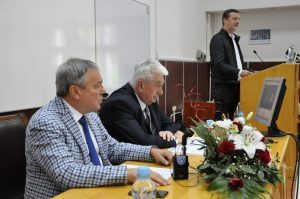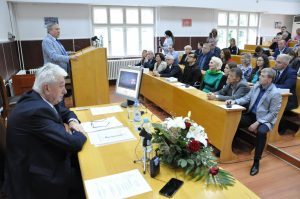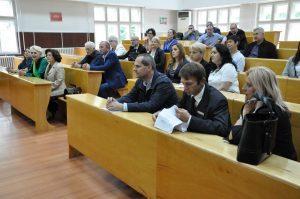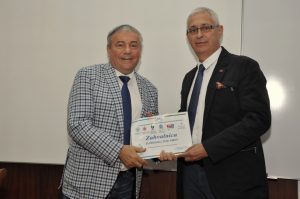9TH INTERNATIONAL NATURAL RESOURCE MANAGEMENT SYMPOSIUM SUCCESSFULLY HELD
Faculty of Management in Zajecar, in cooperation with partner institutions Faculty of Economics Lum Jean Monnet University Bari, Italy, Stanislaw Staszic University of Applied Sciences in Pila, Poland, Free Zone Pirot and The Regional Development Agency of Eastern Serbia (RARIS) successfully organized the 9th International Symposium on Natural Resources Management. The aim of the symposium was to define the main problems and to propose optimal solutions in the field of economics and management of natural resources. The symposium covers scientific fields: natural resources, economics, management and human resources, sustainable development, environmental protection, energy, organizational behavior and socially responsible business, etc.
The symposium was held on May 31, 2019 in Zajecar at the Faculty of Management and gathered 117 participants from Serbia and 23 from abroad.
The host of the Symposium was prof. Dr. Dragan Mihajlovic, Dean of the Faculty of Management Zajecar.
Symposium participants and guests were greeted by prof. Dr. Mica Jovanovic, Rector of Megatrend University who said, among other things:
“This is a great gathering of people from the region, and I am particularly pleased that they came interested in this topic from Bulgaria, Montenegro and the region, and I hope that there will be many more symposia on natural resources here. When it comes to natural resources, in my opinion, human resources are the most important natural resources. The human mind alone has no limit, and it is the only natural, limitless, ever-evolving and sustainable resource. ”
Professor Jovanovic pointed out that there is not much consideration for natural resources.
“When we talk about them, we also need to talk about ecology, which needs to be brought into the consciousness of our people, and to try and preserve and improve those resources that seem unsustainable to us at first glance.”
On the representatives of the City of Zajecar, the participants of the Symposium were greeted by Milan Stankovic, Assistant Mayor.
In the solemn part of the Symposium were thanked for their contribution to the work and development, namely: the Regional Agency for Development of Eastern Serbia and the Free Zone Pirot.
In the first part of the Symposium, three plenary lectures were held:
The first lecture was delivered by Academician Vasily Isaev from the Faculty of Forestry, University of Belgrade, Institute of Forestry, Belgrade, on the topic: SPECIFICITY OF MANAGEMENT OF GENETIC RESOURCES OF FOREST SPECIES, who said, among other things:
“It is no coincidence that Zajecar was chosen, bearing in mind that Eastern Serbia, as part of the Balkan Peninsula, encompasses a very large potential of various natural resources, the first of all water, ore and natural resources, in the first place in forests In view of this, this organized gathering with foreign participants is one of a series of contributions predominantly to public opinion on the importance of natural resources, which is multifactorial, not only from economic, but also has a general, social, historical, The restoration and conservation of natural resources goes beyond the current knowledge of its importance, not to the current generation, but to the generations to come, not only in the direct products used today but far more in what it will provide Climate change will affect the fact that in the second half of the 21st century, water will be a natural resource, which unfortunately will most likely be an internship onal conflict and war, ”said Isaev.
Plenary lectures were also held by:
Dr Dragan Kostic, Director of the Free Zone Pirot, on the topic: LOGISTICS CENTERS IN THE FOURTH INDUSTRIAL REVOLUTION
Dr. Šemsudin Plojović from the International University of Novi Pazar, on the topic: THE POSSIBILITIES OF APPLYING ICT IN THE PROMOTION OF THE PROMOTION OF THE TOURIST POTENTIAL OF SERBIA
The symposium was financially supported by the Ministry of Education, Science and Technological Development, and all scientific papers were published in the Proceedings.








